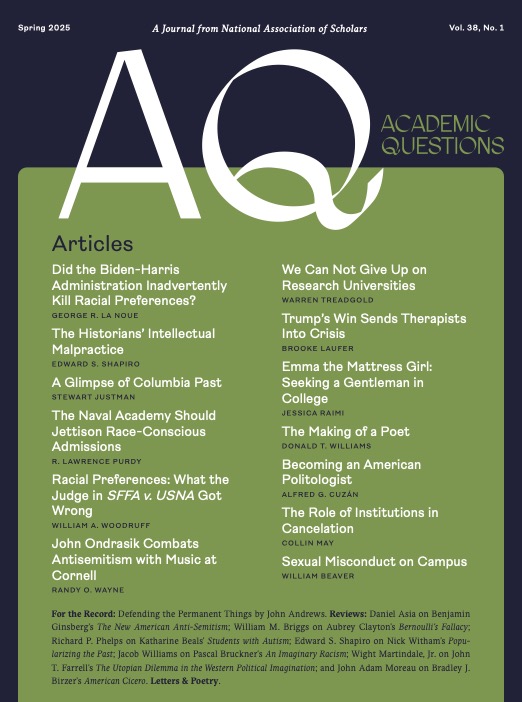To the Editor:
Yuriy Karpov's "Why are K-12 Schools Turning Out Radicals?" (Winter 2024) did an excellent job of depicting the problem of worldview proselytizing by teachers.
Think of the delicious opportunity offered by these teachers for cost-free virtue-signaling that asks little more of students than marching in the streets and yelling on camera while carrying a sign. This is too tempting an opportunity for discontented, indulged, and ungrounded young people to resist, and many will have found their cause—a person can feel virtuous without personally being virtuous!
We used to teach about personal sin and accountability, in accordance with our Judeo-Christian worldview. But now, as we know, in almost all courses, including English literature, students are taught to see the world in terms of groups, with some groups identified as virtuous and innocent, and others as dominating and evil. The idea of personal sin is virtually gone.
We saw this concept in the murder of healthcare CEO Brian Thompson. An Emerson College poll found that 41 percent of respondents age 18-29 thought the executive's murder was "either somewhat or completely acceptable." Apparently CEO Thompson belonged to a "bad" group, like pro-life activists and fossil-fuel executives, so regardless of any personal virtue on Thompson's part, his role in a disfavored "group" meant that he "deserved to die."
Two hundred years ago when American pioneers began to cross the plains of the West, they encountered this same form of morality. If a white man had hurt an Indian, that Indian's tribe felt that they were justified in killing any white man, white woman, or white child who they subsequently encountered in another wagon train that followed. That was in accordance with the Indian concept of "tribal justice." If someone in your racial group sins, you must pay for his sin.
When the Judeo-Christian understanding of individual accountability was thrown out of the schools, and the word "sin" erased from our cultural vocabulary, this new form of tribal morality took over. This idea of group responsibility, rather than personal sin, means a return to the primitive concept of justice that was a mark of barbarism.
This shift marks a new, backward turn for civilization itself.
Linda Ames Nicolosi
Thousand Oaks, CA
To the Editor:
In the Fall 2024 issue of Academic Questions, Adam Ellwanger makes a good case for teaching standard English despite the fifty years of agitation against it since the 1974 meeting of the Conference on College Composition and Communication and its resolution on “Students’ Right to their Own Language”1 He usefully shows that the alleged “myths” about standard English—that it exists, that it can be taught, that it is not inherently racist and oppressive and can be taught without denigrating other dialects, etc.—are not myths at all but simply true.
The case for standard English becomes even stronger when we remember the roots of the not-at-all arbitrary criteria by which the “standard” is identified and discerned. They go back as far as George Campbel’s Philosophy of Rhetoric, which in a wonderful historical serendipity was published in the same year as our Declaration of Independence. He specified as authoritative that usage which is national, current, and reputable. It is national—not limited to one region, race, class, or subculture; current—neither so old as to be archaic nor so new as not yet to be universally accepted; and reputable—representing the practice of professional writers who have been edited by professional editors.2
The prescriptions of the school marm then are not arbitrary but are based (whether she knows it or not) on the wholly non-judgmental and scientific work of Descriptive Grammarians, who study a huge corpus of professional writing in reputable national publications and note that those writers tend to write in complete sentences unless they have a very good reason not to. (What kind of reason would count? The answer to a rhetorical question, for example.)
They tend to make their subjects agree with their verbs, and, until the banishment of generic he, they tended to make their pronouns agree with their antecedents. They deploy their cases appropriately; they tend to avoid comma splices. Based on these reported tendencies, the Prescriptive Grammarian then comes up with rules that are not arbitrary pronouncements from some kind of linguistic Mount Sinai but are simply a description of what you need to do if you want to present yourself as belonging in professional society.
Whether we like it or not, it is an obvious advantage to people in business, in communication, in education, and in politics to have access to a form of speech that is going to be understandable by anyone in their potential market, audience, or clientele. Precisely by being the usage that is national, current, and reputable, standard English is that language. People who use a particular slang usually understand standard English perfectly well even if they do not know how to use it, while people unfamiliar with their particular argot may not understand them. Correct punctuation neither hinders nor offends any reader while a lack of it can present problems for some. Race has nothing to do with it. The speech of the Valley Girl and the white Redneck (and of the jargon-dependent Post-Modern Academic) are non-standard by precisely the same criteria as the speech of the ghetto. If standard English was good enough for Martin Luther King, Jr., who was rather masterful at it, it ought to be good enough for me.
We have done a disservice to our students if we do not give them the ability to use standard English in those settings that call for it. I myself speak fluent Redneck (technically, South Midland or Hill Southern), the language of my birth, and might well still use it with some of my cousins or my neighbors. I did not use it in this essay. I was given that option by my English teachers and professors, who were trained before the CCCC’s nonsense became chic.
I would be ashamed not to have given my own students the ability to make the same choice. And that is why the date of Campbell’s book is so wonderfully appropriate. The same year that clarified the grounds of our political freedom also laid the foundation for linguistic liberty, the ability to address the nation without impediment by recognizing some usages are national, current, and reputable, and some are not. It may not be purely a coincidence that often the same people who fail to appreciate the one set of freedoms also object to the other.
Donald T. Williams
Professor Emeritus
Toccoa Falls College
Toccoa Falls, Georgia
1 “Fifty Years of ‘Students’ Right to their Own Language,’” Academic Questions 37, no. 3 (Fall 2024): 69-76.
2 Alfred C. Baugh and Thomas Cable, A History of the English Language, 6th ed. (Boston: Pearson, 2013): 277-8.
Photo by Kelly Sikkema on Unsplash














